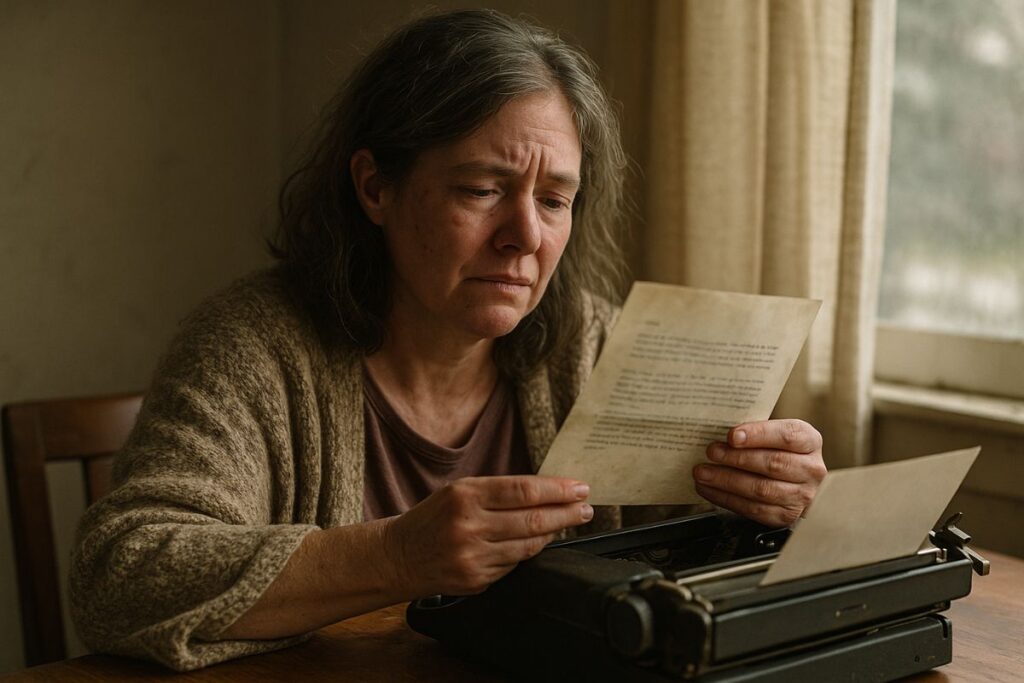🟫 Part 7 – The Last Sunday Together
The attic was colder that evening.
The kind of cold that settled in old wood and quiet bones.
Elena pulled the string to turn on the single bare bulb above, its yellow glow flickering like a candle that had already said most of what it had to say.
She reached into the bottom of the box again.
There it was—thicker than the others.
Seven full pages, typed clean, aligned perfectly. Titled simply:
“The Last Sunday Together”
She sat cross-legged on the floor, quilt wrapped around her shoulders, the paper warm from her hands.
“You brought soup.
I remember that first. The kind with barley and tiny carrots. It made the house smell like memory.I didn’t say thank you.
I should’ve. But something in me knew…
that you weren’t there for thanks.
You were there because something inside you remembered who we were before the silence.”
Elena exhaled, slow and uneven.
That Sunday had been strange, quiet.
He hadn’t turned on the TV.
He just sat in the recliner with his legs wrapped in the quilt, his eyes half-closed as if listening for something she couldn’t hear.
She had set the soup down beside him.
Pulled a chair to the other side of the room.
They didn’t talk much. But she’d brought her phone, played a Debussy piece through its small speaker—his favorite.
“You played music that day. The kind your mother loved.
The kind I stopped playing when she died because it hurt too much.But when I heard it again, I didn’t feel pain.
I felt… you.
I felt us.”
Her eyes burned.
She remembered watching his foot move slightly under the blanket—just enough to follow the rhythm.
He hadn’t spoken for almost twenty minutes.
And then he whispered, almost to himself:
“I used to dance with your mother in this room.”
“The soup tasted like rosemary and home.
And your silence was not heavy. It was kind.I didn’t know if you were staying the night.
I didn’t ask.
Because sometimes, when people stay, it hurts more when they leave.But you didn’t leave. Not that day.
You fell asleep on the couch, and I stayed awake, listening to you breathe.”
Elena felt the weight of those words settle over her.
She had forgotten that she stayed.
Somehow, across the grief and guilt and letters never sent, she’d erased the truth of that one small grace:
She stayed.
She returned to the typewriter.
The room hummed with quiet.
The bulb above her cast long shadows behind the boxes and beams.
She fed in a fresh page.
“Dear Dad,
I didn’t know that Sunday would matter.
I brought soup because it was the only thing I knew how to do.But I remember the way your eyes softened when Debussy started.
I remember how you said nothing, and yet I felt more heard than I had in years.”
She paused. Let the carriage return.
“I stayed the night.
Not because I had nowhere to be.
But because I wanted to remember you breathing.And now, I’m so glad I did.”
She returned to the letter.
“You asked me—just before you drifted off—what I thought heaven sounded like.
I said I didn’t know.
But I do now.
It sounds like your quiet footsteps in the hallway.
Like soup simmering on a Sunday stove.
Like a daughter coming home without needing a reason.”
Elena set the pages down, her hands trembling not with cold, but memory.
She hadn’t remembered asking him about heaven.
But she remembered the silence afterward.
How peaceful it had been.
No arguments. No apology. No last words shaped like confessions.
Just music.
And breath.
And soup.
She stood and looked out the attic window.
The streetlights below flickered on one by one.
Somewhere in the distance, a neighbor’s wind chime called softly in the breeze.
This was what he wanted.
This house. This quiet ending.
No nurses at night, no monitors beeping, no curtain dividers or rotating shifts.
Just the sound of a child returning.
She gathered the pages, kissed the top one softly, then returned to the typewriter one last time that evening.
“I don’t know what heaven sounds like either, Dad.
But I think that day, we heard it.Not in the music.
But in the way you looked at me without needing to say a thing.
I’m writing all of this now, not because I want to hold on to the past—
but because I want to thank you…
for the day you let me come home.”
Outside, the rain had stopped.
Inside, the attic had never felt more full of warmth.
Continue Reading 🟫 Part 8 – The Apology I Never Gave


